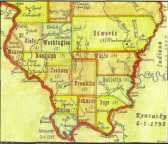 |
Home | Search | Browse | About IPO | Staff | Links |
 |
Home | Search | Browse | About IPO | Staff | Links |
|
BEER ON THE FRONTIER By Curtis Mann
Whiskey was the liquor of choice on the Illinois frontier and for some the only choice. The fiery libation was considered a necessity at social functions such as weddings and elections, and likewise flowed freely at communal projects such as corn huskings and cabin raisings. But for many pioneers of the English Settlement in southeastern Illinois, whisky was a poor second to another drink. "Beer is the principal thing among the English in this settlement and a good stock of that is absolutely necessary for me to keep on hand," wrote tavern-keeper James Jackson of Wanborough, Illinois, to his supplier. Jackson was the first to set up shop in Wanborough, a community platted in August 1818 by Morris Birkbeck, one of the founders of the English Settlement in southeastern Illinois. Birkbeck and George Flower had partnered together to establish a colony of their fellow countrymen in 1817. However, a parting of ways led to the creation of separate towns, Wanborough and Albion.
Wanborough, located two miles west of Albion in Edwards County, consisted of 32 lots, each about 5 acres in size. Birkbeck recruited a number of tradesmen and merchants to settle in his embryonic community. One of these merchants, James Jackson, opened a tavern in Wanborough in the summer of 1819. Jackson's relationship with Birkbeck, at first, was on good terms. Birkbeck wrote a letter of introduction for Jackson to Frederick Rapp at Harmonic, Indiana. Harmonie was the creation of George "Father" Rapp, founder of a communal religious society wherein all things were held in common and members of both sexes adopted the practice of celibacy. In 1815 the "Rappites settled on a tract of 27,000 acres along the Wabash River in southwestern Indiana. In their new settlement, the Rappites prospered on such industries as weaving, milling, and brewing beer. Frederick Rapp, son of George, handled all commercial dealings with the English settlers who depended on Harmonies commerce for staples such as flour, salt, and sugar. Jackson likewise depended on the Rappites for his tavern's beer. The Flowers at Albion also purchased beer from Harmonie for the tavern and their own consumption. The relationship between Birkbeck and Jackson soon soured. In a letter written to Frederick Rapp in June 1821, Jackson accused Birkbeck of establishing a boarding house and brewery in Wanborough to compete against Jackson's tavern. The brewery, operated by Richard Backhouse, opened early in 1821 and was a welcome addition to the English settlement. Birkbeck's oldest son, Richard, reported to an uncle about the status of alcohol in the colony in 1822. "Whisky, almost the only liquor which has been known in these backwoods, until about a year ago, is twenty-five cents per gallon. But we have now plenty of tolerable beer, which is selling at eight and four dollars per barrel, eight dollars the best, four the inferior." 
While Richard was not enthusiastic about the quality of the beer, his neighbor John Woods recorded in his journal that Backhouse had "brewed a considerable quantity of beer this season. As barley is not to be procured, he has made his malt of wheat. This beer is far preferable to the Harmonie beer." Richard Birkbeck's follow up comments to his uncle provide some insight into why he viewed the beer as just "tolerable." "I grew twelve acres of wheat last year, but it had a disease peculiar to America, and which was fatal to many of the crops of wheat in the western country last year. The brush end of the grain, perhaps one out of four or five, is a bright vermilion, and if you eat bread made from that wheat it acts as a violent purgative, causing the most dreadful nausea. My wheat was in that state. I sent twenty bushels to the brewer that he might malt it and make beer. I tasted some of the beer and it was nearly as distressing in its effects as if I had taken emetic tatar. The brewery at Wanborough proved to be too much competition for James Jackson. Having mortgaged his property to secure credit from Rapp, Jackson was unable to cover his note. He signed his house and lot over to Rapp and left Wanborough in 1822, bound for New York and possibly England. If he could have held on for a couple of years, Jackson might have prevailed. A census of Wanborough shows that Backhouse continued to reside in the village through 1824. Then, for unknown reasons, he closed the brewery and left. With Backhouse's departure, beer production at Wanborough dried up. The village itself slowly deteriorated. From 75 people in 1822, the population dwindled to less than 50 in just a few years. The death of Morris Birkbeck in June 1825 deprived Wanborough of its chief benefactor. A German visitor to Wanborough in 1835 recorded the village as being "eight or ten dilapidated huts, a mill, a workshop and a pottery." Today all that remains of the site is a cemetery. Curtis Mann grew up in the English Settlement of Albion, but now lives in Springfield, where he is a local history librarian at Lincoln Library's Sangamon Valley Collection. Illinois Heritage 9 |
|
|